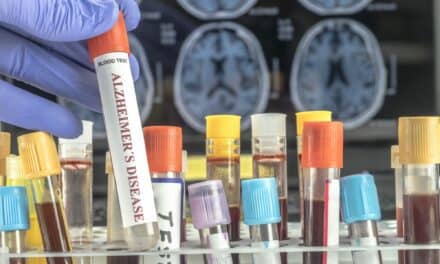Roche’s Elecsys beta-Amyloid (1-42) CSF II (Abeta42) and Elecsys Phospho-Tau (181P) CSF (pTau181) assays received U.S. Food and Drug Administration (FDA) 510(k) clearance. The Elecsys AD CSF Abeta42 and pTau181 assays (used as a pTau181/Abeta42 ratio) measure two biomarkers that are hallmarks of Alzheimer’s pathology, beta-amyloid and tau proteins, in adults ages 55 and older being evaluated for the disease.
Currently, the diagnosis of Alzheimer’s is a diagnosis of exclusion, largely based on various cognitive tests, routine laboratory tests and structural imaging (MRI or CT scan). Clinical criteria are currently limited and lead to an accurate diagnosis in only 70%-80% of cases.1 To increase diagnosis accuracy, an amyloid positron emission tomography (PET) scan, that measures the build-up of abnormal beta-amyloid protein in the brain, can be used as an adjunct to these evaluations.2 However, the high cost, limited availability and exposure to radioactivity limit its use.
The Elecsys AD CSF assays achieve 90% concordance with the Amyloid PET scan imaging3 and have the potential to provide a more affordable and accessible routine option to confirm the presence of amyloid in the brain, Roche says. They also offer detection of multiple biomarkers from one draw, with no radiation and potential to detect Alzheimer’s pathology in early stages of disease.4
“Globally, up to 75% of people living with Alzheimer’s disease have not been diagnosed, and those who have often report a long and complicated process4,” says Thomas Schinecker, CEO of Roche Diagnostics. “The Elecsys AD CSF assays have the potential to guide more people with suspected Alzheimer’s disease to-wards a diagnosis than ever before. As we are starting to see exciting results for new potential Alzheimer’s treatments, reliable tests that have been clinically vali-dated will be critical in ensuring the right patients are identified and able to benefit from them.”
An early and accurate diagnosis allows those facing Alzheimer’s, under the guidance of their physician, an opportunity to take steps to preserve cognitive function, make better care plans and get involved in clinical research that may lead to new treatments.
Research suggests that disease modifying therapies are likely to be most beneficial when used in the earliest stages of the disease. Therefore, early and accurate diagnosis will be even more essential to ensure that people with Alzheimer’s receive the right treatment, at the right time. Due to the large installed base of instruments, the Elecsys AD CSF assays are easily scalable to meet the imminent demand that these therapies will generate as they become available.
Roche’s Elecsys AD CSF assays are already registered in 45 countries worldwide, including those accepting the CE Mark. In July, Roche also announced that the FDA granted Breakthrough Device Designation to its Elecsys Amyloid Plasma Panel, an innovative, minimally invasive and easily accessible solution that enables the measurement of Alzheimer’s biomarkers from a blood sample.
These assays are still in development but once they are available, they could be used to streamline patients toward confirmation of amyloid pathology using the Elecsys AD CSF assays.
Featured image: The Elecsys Alzheimer’s disease (AD) CSF assays will be available on the cobas fully automated immunoassay analyzers (pictured), enabling patients to get broad access to high quality testing in a timely manner. Photo: Roche
References
- Sabbagh MN, Lue LF, Fayard D, Shi J. Increasing Precision of Clinical Diagnosis of Alzheimer's Disease Using a Combined Algorithm Incorporating Clinical and Novel Biomarker Data. Neurol Ther. 2017 Jul;6(Suppl 1):83-95. doi: 10.1007/s40120-017-0069-5.
- Rabinovici GD, et al. Association of Amyloid Positron Emission Tomography With Subsequent Change in Clinical Management Among Medicare Beneficiaries With Mild Cognitive Impairment or Dementia. JAMA. 2019;321(13):1286-1294.
- Elecsys®β‑Amyloid (1‑42) CSF II assay and Elecsys® Phospho‑Tau (181P) CSF assay method sheets.
- Hampel H. et al., Nature Aging | VOL 2 | August 2022 | 692–703
- ADI. Over 41 million cases of dementia go undiagnosed across the globe – World Alzheimer Report reveals. Available at: www.alzint.org/news-events/news/over-41-million-cases-of-dementia-go-undiagnosed-across-the-globe-world-alzheimer-report-reveals. Last accessed: July 2022.





